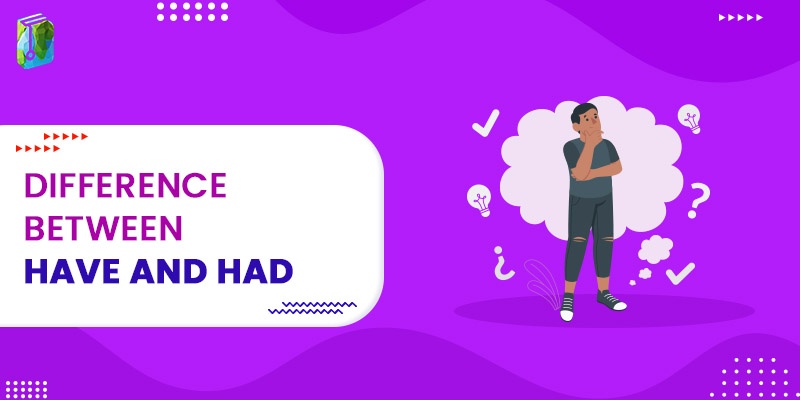Generally, you may face ambiguities while using Had and Have. To resolve this confusion, you have found the right place.
In the English language, Had and Have are two auxiliary verbs. Both these verbs are used in different tenses. These two verbs, have and had, fall under auxiliary verbs. Simply put, Had is the past perfect tense, whereas, Have is the present perfect tense.
This is the most vital difference between these two forms of verbs.
Now, let us dig deeper and understand the concept with the help of examples.
Difference Between HAD and HAVE
Have- Usage:
The Have verb is the present tense form of another verb, ‘to have.
The verb have has the following forms:
- Have
- Having
- Has
- Had
Have is the base form of the verb and present participle – having. The past tense and past participle form is had.
Here are a few examples using the verb have:
- I have 15 books
- You have a spectacular mansion
- They have two dogs
As it is evident, in all these examples Have is used as a verb. In addition, you must remember that Have is used with plural nouns and pronouns only.
Now, take a look at some other examples showcasing the usage of have in different forms:
- I have come to see the exhibition
- I have given him a book
In these statements, you can observe the usage of have in the past perfect tense.
NOTE: You can not use have with the third person.
Moreover, the present and past forms are generally contracted in everyday speech. Mostly, when have is used as an auxiliary verb.
Here are the contracted forms:
| have = ’ve | I’ve seen that temple. |
| has = ’s | He’s visiting the museum. |
| Nihaal’s behaved badly. | |
| had = ’d | You’d better leave. |
| I’d go to that shop. |
Interestingly, the auxiliary verb have can be used in plenty of forms. You may have encountered questions such as, ‘Have you visited Santorini’?. Here, have has been used in the form of a question.
Now, let us move to the next segment and understand the usage of Had.
Had – Usage
The Had verb is the past tense form of another verb, ‘to have’. Here are some example statements for you:
- I had a water bottle
- She had plenty of books at her house
- They had three pets
You can notice the usage of Had with both singular and plural nouns as well as pronouns. Unlike the auxiliary verb have, you can use had with first, second, and third person.
Observe the below-stated statements for more clarity:
- I had gone for a walk in the morning
- You had to visit the mall
- She had organized a seminar
In all these sentences, you can see the usage of had in different forms. Moreover, had is used in some special cases such as, ‘Had you been to the market, we would get late’. This sentence is formed as per the conditional tense.
Additionally, had can also be used in contracted forms, such as:
| had = ’d | Until he bought his car, she’d been saving money for many years. |
| When I arrived, he’d been in my cabin for an hour. | |
| I’d better leave for my home. |
In a nutshell, the KEY DIFFERENCES between these two auxiliary verbs are:
- Have is a present form, whereas Had is in the past form
- Use Have with plural nouns and pronouns and Had with both singular and plural nouns and pronouns
- Have is used in the present perfect tense, whereas had is used in the past perfect tense
Conclusion
Understanding the difference between “have” and “had” is key in English grammar. “Have” is used for present actions, while “had” is for past actions. For example, “I have many friends” talks about now, but “I had a lot of fun” refers to the past.
When discussing actions happening now or in the future, we use “have.” For instance, “I have eaten pasta today” or “They will have been running for 5 hours.” On the other hand, “had” is used for actions that already happened in the past, like “I had a lot of fun last night” or “If I had had any idea, I would have told you.”
Understanding when to use “have” and “had” helps us speak and write correctly in English. If you have any questions, feel free to ask in the comments. Keep learning, and don’t forget to keep smiling!
We hope the information in this article adds value to your knowledge base and resolves your queries.
Happy Learning!
People are also reading:

